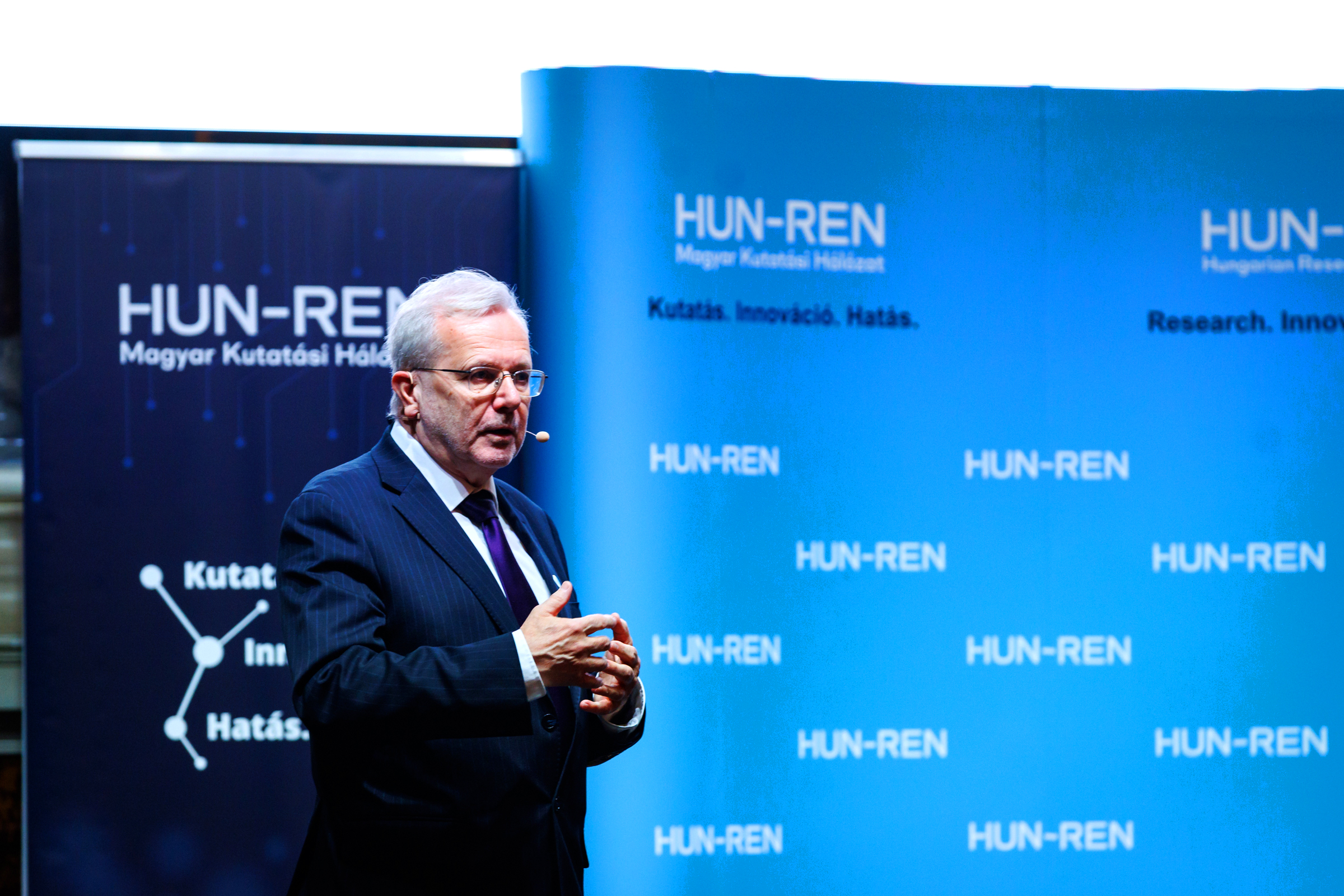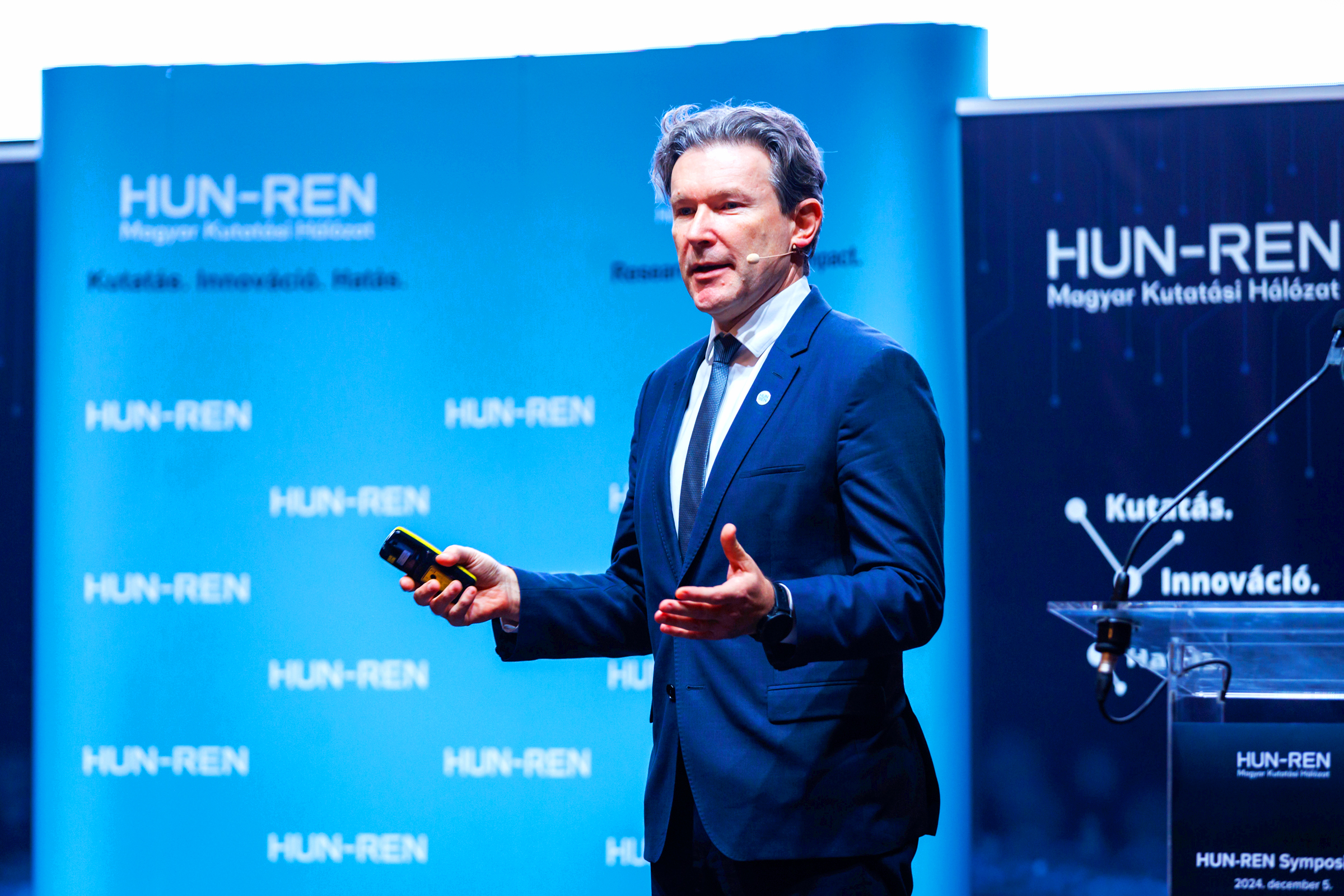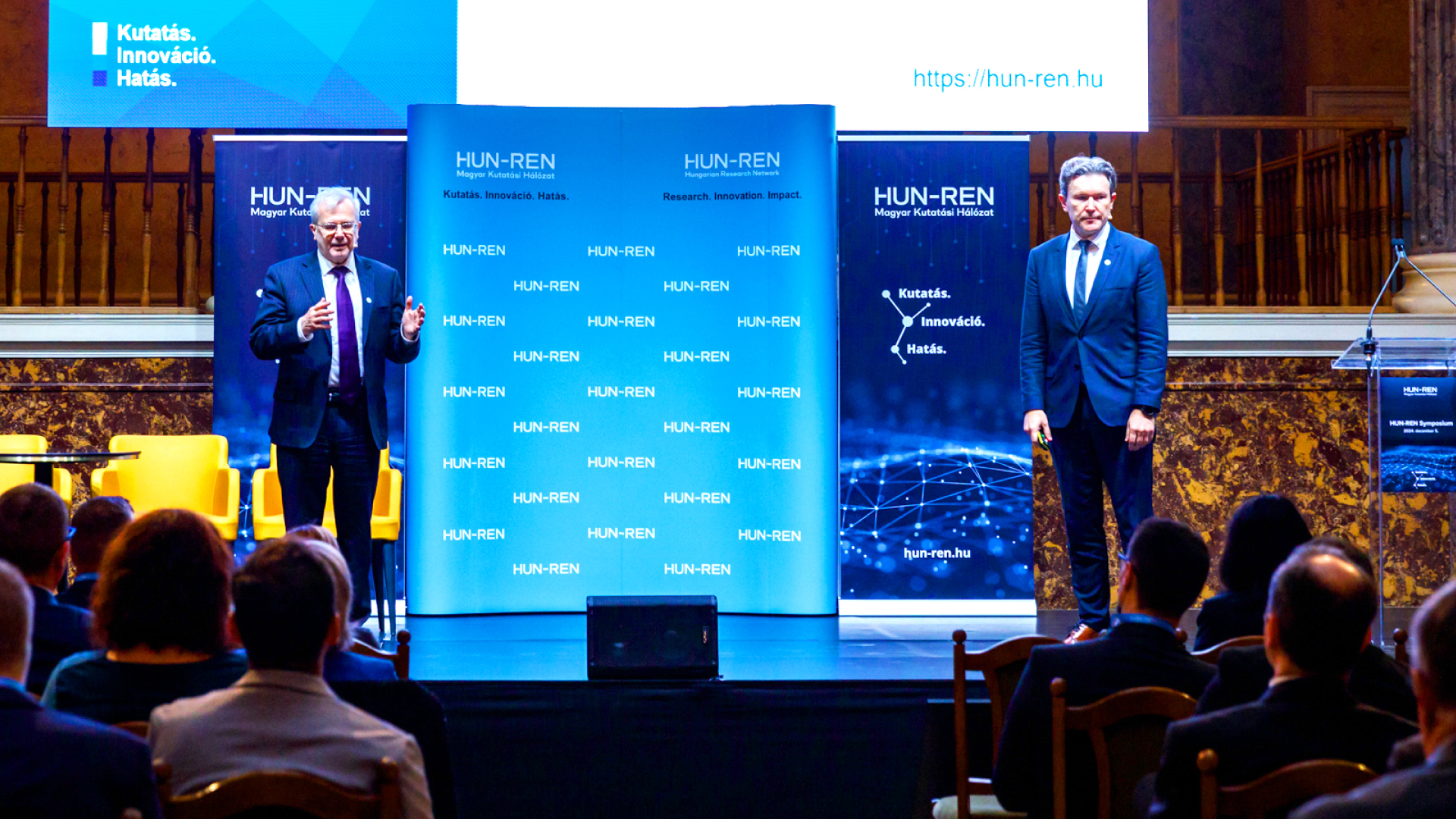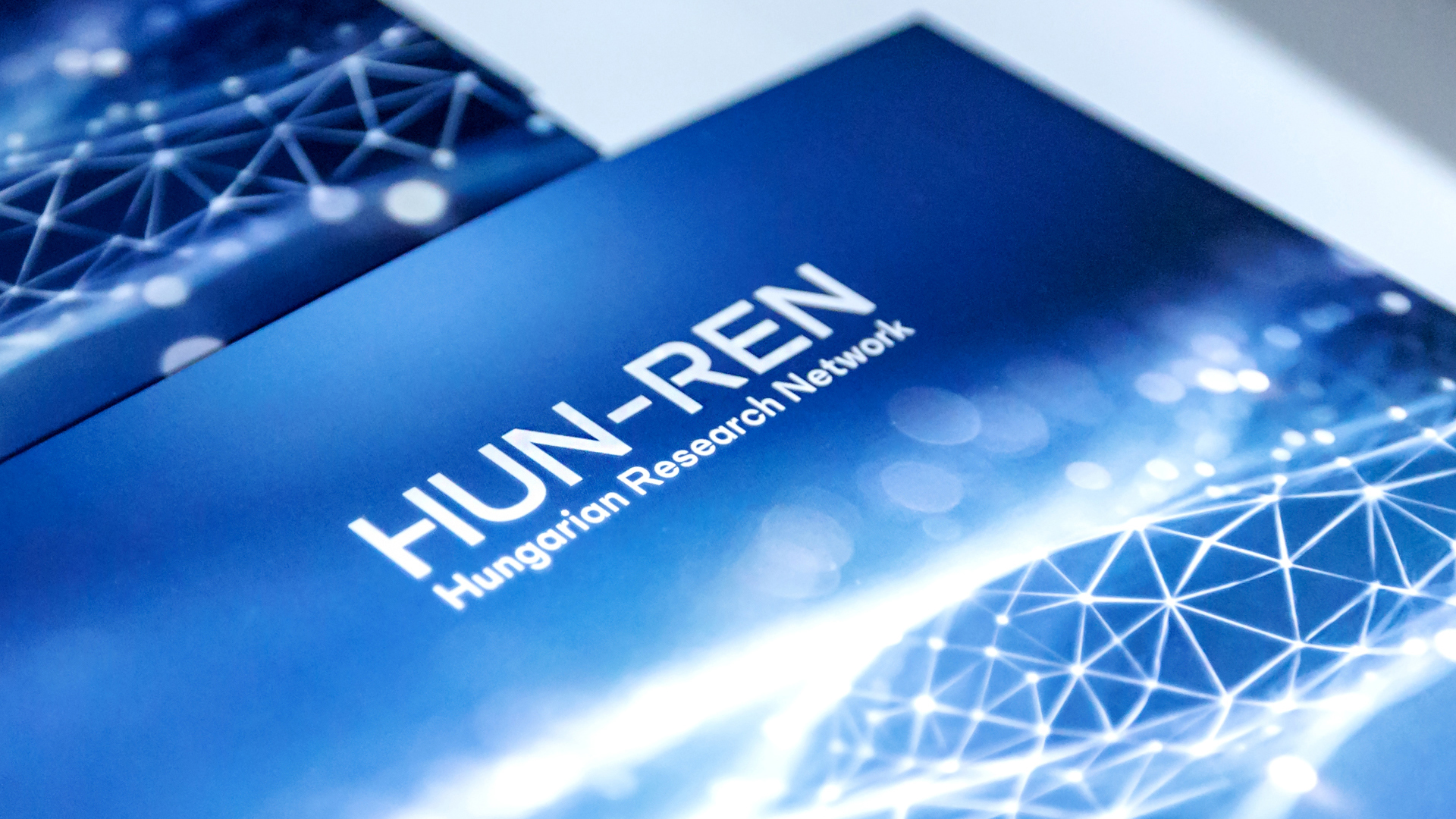HUN-REN Poised to Become a More Responsive, Collaborative, Performance-Driven, and Efficient Network
Joint presentation by the President and CEO at the HUN-REN Symposium: summary
The renewal of HUN-REN was preceded by extensive analyses and evaluations. These included assessments of research capacities, funding, organisational structure and governance, and scientific performance across HUN-REN research sites. These evaluations drew on data from MTMT, Scopus, and institutional reports, while simultaneously reviewing the activities of 24 research networks from 18 countries based on Scopus, Cordis, and publicly available research network reports, explained President Balázs Gulyás at the Symposium. He added that much of the work carried out over the past year and a half relied heavily on institutional self-assessments aimed at understanding the RDI performance of research sites, as well as international evaluations conducted according to pre-established criteria, which included personal interviews and the participation of 100 experts. In his contribution to the presentation, CEO Roland Jakab highlighted that this comprehensive process was complemented by eight working groups comprising internal and external experts, including several representatives from research sites. Focusing on strategic issues, these groups tackled and resolved key organisational and governance challenges and ultimately developed action plans.
Following a multi-faceted, complex, and detailed assessment, HUN-REN’s leadership is convinced that the issues identified in the operation of the research network require systemic reform, as they cannot be addressed individually. Its current operations are inefficient both professionally and functionally, and the utilisation of synergies remains inadequate.

President Balázs Gulyás explained that, due to the operational difficulties posed by public finance regulations, he sees the need to reform the operational model and establish a dedicated legal framework for the organisation’s specific status. In his view, base funding fails to incentivise performance—whether at the network, institutional, or individual level—making performance-based funding essential, supplemented by additional resources, as underfunded operations cannot be resolved through cost-saving measures alone. He highlighted that researchers’ average salaries are extremely low compared to European standards, presenting significant challenges in attracting new talent, retaining outstanding researchers, and creating a viable career model. He also pointed to the fragmented nature of research topics, some of which are misaligned with Hungary’s social and economic objectives. Consequently, more strategic management of the research portfolio is indispensable.
Due to the outdated structure of the research network, the HUN-REN HQ currently plays only a coordinating role and does not provide an adequate framework for operations. At many research sites, both strategic and operational management could benefit from significant improvement, added CEO Roland Jakab. Furthermore, most of the real estate used by the research sites remains under the ownership of the Hungarian Academy of Sciences, with no development or responsible management of these properties in recent years. Autonomy undeniably requires the establishment of a high-quality working environment within the organisation’s own properties in order to provide state-of-the-art infrastructure.
The principles of the new model were incorporated into the draft law at HUN-REN’s initiative, emphasised CEO Roland Jakab while commenting on the bill submitted on 19 November. He noted that it is still evolving daily, with the final version—if adopted—set to enter into force on 1 January 2025. Key provisions affecting research sites, including those concerning legal status and funding, are scheduled to take effect on 1 April 2025. The modernisation process will not disrupt day-to-day operations, Roland Jakab assured the audience of HUN-REN leaders and researchers.

“We aim to become a more responsive, collaborative, performance-driven, and efficient network,” outlined President Balázs Gulyás as the overarching objective during the joint presentation by the President and CEO. Highlighting the key tasks to achieve this vision, he emphasised the importance of establishing a network approach and operating model capable of delivering multidisciplinary solutions to complex societal and economic challenges. The presentation also underscored the necessity of developing a research portfolio that strikes a balance between basic and applied research, taking into account socio-economic applicability. Equally crucial is the need to leverage the advantages of networked operations not only in core activities but also in supporting functions, alongside the introduction of a performance-related salary system featuring significant salary increases and rewards for individual achievements and objectives. The President further highlighted the imperative of implementing a career model for both researchers and support staff by enhancing conditions to attract young talent, strengthening international partnerships, attracting foreign researchers, and staying aligned with global trends—all within an operational framework that prioritises shared goals and collaboration.
In the new model, the derivative legal personality of research institutions will enable more efficient management, explained President Balázs Gulyás, reaffirming that HUN-REN will have a specific legal personality under the new law. The existing research centres and independent research institutes will continue their activities as organisational units with derivative legal personality. HUN-REN will operate outside the state budget framework, subject to the general rules for legal persons set out in the Civil Code. The founding rights will be exercised by a seven-member executive and decision-making body, the Governing Board – led by the President – i.e., HUN-REN itself. The CEO will serve as the operational leader of the new organisation, while the scientific and innovation activities of the research institutions will be coordinated by Vice-Presidents overseeing specific scientific fields. It has also been clarified that the reform will not affect the status of corporate shares and movable assets currently owned by the institutions. Key priorities include the implementation of a planned career model, accompanied by salary adjustments, the creation of an efficient organisational structure, and the establishment of central service functions to support research and innovation. These measures are designed to enable the research institutes to focus their capacities more effectively on core activities, in line with state-of-the-art practices in countries such as France, Spain, Germany, Japan, and Singapore.

With regard to the planned funding, both leaders reiterated that performance-based funding will involve a significant increase in resources, laying the foundation for a career model. Value-based funding is also crucial for responsible property management and development, as well as for salary adjustments. Balázs Gulyás and Roland Jakab reported that, starting in April, the monthly support from the public budget will increase by 50%, with additional funds allocated to cover the costs of the transformation process.
Both the President and the CEO emphasised the significant role of representatives from research institutions and academia in the new governance model. The work of the Governing Board will be supported by the Scientific Advisory Board and the Collegium of Institutional Leaders, which comprises the heads of research organisations and serves a consultative role. The Vice-Presidents will coordinate the scientific and innovation activities of the research institutions across the three main scientific fields, with support from the Scientific Research Councils for each field.
It is crucial that HUN-REN continues to operate completely independently, emphasised CEO Roland Jakab. Both leaders explained that the bill contains several safeguards to ensure HUN-REN's operations remain independent from political influence: the seven-member Governing Board, composed mainly of academics, will remain the decision-making body within HUN-REN's governance structure. Once HUN-REN is established by the State, the Board will assume the founding rights and retain powers similar to those of the current Governing Board, which the Constitutional Court has confirmed align with the principle of freedom of scientific research. Members of the Governing Board will be subject to strict conflict-of-interest regulations.
The research institution leaders will continue to make decisions or make proposals to the Governing Board on fundamental issues concerning the operation of their institutions, including matters such as the organisational structure of the institutions or the definition of their operating procedures. They will exercise employer’s rights, manage their institution’s public service tasks and core activities, and be responsible for their institution’s performance measurement and evaluation system, as well as for the conclusion of cooperation agreements and contracts related to scientific work, the implementation of their institution’s business plan, budget, and asset management. They will also be responsible for developing the research institution’s scientific strategy, coordinating scientific and innovation activities, submitting and implementing research-related proposals, and carrying out science communication tasks.
The ultimate goal of the transformation is to strengthen the effectiveness of the network, with a focus on the research community and its support, enabling the production of innovative, internationally competitive results that contribute to the advancement of national research performance and to addressing socio-economic challenges.

